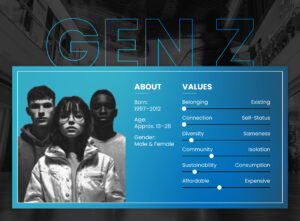Beyond the Sale: Why Gen Z’s Loyalty Starts Before They Ever Buy
By: Marco Oppici
At NELSON Worldwide, our luxury retail team partners with leading brands to design spaces that move beyond transactions and into cultural relevance. Today, that matters more than ever. Luxury is at a crossroads: Gen Z is redefining what loyalty means, and brands that don’t adapt risk irrelevance. Despite overall market stability, luxury sales to Gen Z fell 7% last year—a signal that it’s not luxury they’re rejecting, but outdated approaches. Emotional connections now form long before purchase, shaped by the environments we design, the experiences brands deliver, and the values they live.
To understand what’s driving this shift, it helps to look at the values that define Gen Z.

Forget the Funnel. Think Ecosystem.
Gen Z doesn’t move through a traditional sales funnel. They’re curating an identity—online and IRL—where brands act less like labels and more like collaborators. Visiting a concept store with friends, creating content at a pop-up, or attending an exclusive event isn’t about transaction—it’s about cultural participation.
Yes, they follow the brand. But more importantly, they follow the signals—authenticity, inclusivity, sustainability—that shape the brand’s vibe.
The Reality Check: Trading Down, Spending Differently
Economic pressure is real. With rising living costs, 79% of U.S. shoppers are “trading down” to affordable alternatives. For Gen Z, that doesn’t mean abandoning luxury—it means reallocating. Forty percent plan to invest their savings into experiences like restaurants and travel. Many still live with parents, freeing up discretionary income to splurge selectively on handbags, watches, or destination events.
Meanwhile, the resale market is rewriting luxury access. Nearly a third of Gen Zers buy secondhand to afford high-end brands, and 64% prefer pre-owned over new. For them, sustainability and affordability aren’t competing priorities—they’re the same conversation.
The Role of Retail Has Changed
Nearly half of Gen Z’s luxury purchases still happen in-store, but retail no longer exists simply as a point of sale. Stores now serve as platforms for content, community, and credibility. Done well, the physical environment becomes an extension of the brand’s worldview, even if the customer leaves empty-handed.
Design Imperatives for Engaging Gen Z
Design for Exploration, Not Efficiency
Pop-ups, multi-sensory layouts, and social-first moments invite discovery and sharing.
Curate Emotional Resonance Through Materiality
Rich textures, bold contrasts, and layered storytelling transform space into memory.
Embed Technology as Invisible Infrastructure
AR, VR, and mobile-native interfaces aren’t extras—they’re the baseline for frictionless engagement.
Make Sustainability the Luxury
From materials to merchandising, transparency must be both visible and verifiable.
Connection Now, Conversion Later
For Gen Z, loyalty is not tied to immediate spend. It’s built on alignment—platforming diverse voices, delivering inclusivity, and backing sustainability with proof. This loyalty extends beyond stores, into resale platforms, metaverse activations, and cultural events that merge commerce with community.
Even categories like fragrance—on track to hit $62B globally by 2025—are shifting toward intentional, mood-driven, and experimental expressions of identity. These trends reinforce a larger truth: belonging drives buying, and design has the power to amplify belonging.
Where Loyalty Begins
We don’t design for wallets. We design for belonging. For Gen Z, loyalty is earned in the spaces and stories that come before a transaction. At NELSON Worldwide, our luxury retail practice is committed to shaping environments where culture, community, and commerce converge—building not just sales, but lasting brand devotion.

Let's Connect:
Marco Oppici, Design Leader, Retail
Based in New York City, Marco brings forth strong expertise in experiential design, spanning high-end residential, retail, and hospitality projects, as well as visual arts and furniture design. For over a decade, he held a leadership position with Saks Fifth Avenue/HBC Corporation as Vice President of Store Design and Creative Director.
Born and raised in Milan, Italy, Marco developed a personal style that blends New World–forward thinking with a European mindset and a deep passion for the arts. Regarded as highly creative and an effective communicator of design objectives, he is detail-oriented and approaches each project with a comprehensive understanding of the larger picture. Reach out to him at MOppici@nelsonww.com